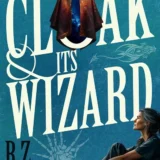
OBIR: Occasional Biased and Ignorant Reviews reflecting this reader’s opinion.

FUSION FRAGMENT #12 – July 2022.
Publisher: Fusion Fragment, Ottawa, Ontario, Canada.
Editor: Cavan Terrill
Cover Art: Kenjay Reyes
FICTION:
Hindbrain – by Lindz McLeod
Premise:
Danni and Steph fear their lesbian marriage is beginning to come apart, especially since the deer began infesting their house again.
Review:
It’s one thing to get an invite to a Cousin’s marriage knowing that many of the other invitees are uncomfortable with your personal set-up, but having to put up with hoof prints on your laundry and piles of scat kicked into corners is just a tad too stressful for comfort. And then there’s the unusually addictive aspect which Danni finds difficult to ignore, greatly adding to Steph’s anxiety.
Of course, in the literal world, if your house is taken over by a herd of deer led by a powerful stag the first thing you should do is get out and call for help. But this is a fantasy in which social pressure to conform is vividly presented as a force of nature near impossible to resist. The “reality” of great, clumsy beasts clomping about one’s home effectively portrays just how intrusive, annoying, and downright demeaning such “peer” pressure can be. Frightening to contemplate how eagerly people you know are willing to destroy you in order to “save” you. In short, the price you pay for being true to yourself may well be a restricted, claustrophobic situational-awareness that threatens your joy of life. No wonder some people commit suicide. They feel it is the only way they can escape.
This story offers a solution. Whether it works or not may well depend on the luck of the draw, but it strikes me as practical and potentially useful.
The value of this story, beyond the fact that it may genuinely inspire some people to cope, is that it offers insight into relationships under social pressure. Prejudice comes in many forms, most notably gender or race-related, and anyone reading this story will gain greater understanding of what it’s like to be condemned for being different, possibly to the point of increasing their reservoir of empathy. In that sense, a deservedly influential story. Well done.
With Everything at its Center – by Timothy Mudie
Premise:
Anthony fell to pieces when his two-year-old son passed away. However, seeing a NASA photograph of his son happily floating inside a recently-discovered black hole has given him a new purpose in life.
Review:
From a critic’s point of view, the editor’s habit of following each story with a mini-interview wherein the author sometimes reveals what they are getting at is slightly annoying. Great if we both agree, but a bit awkward when I come up with an interpretation different from what the author intended. Oh well, so be it. I accept the author’s intention makes perfect sense and is fully supported by the story itself. However, my initial take on this, before reading the interview, is not what the author had in mind.
I couldn’t help but wonder if the basic premise was inspired by the “Starchild” image at the end of the movie 2001, wherein the astronaut has been reborn as a messiah-like being destined to save the human race from itself. In this case, the infant form of what had been Anthony’s two-year-old son is located in a black hole five light years from Earth. He becomes obsessed with the desire to travel to the black hole to be reunited with his child.
Fair enough as a bit of Star Trek-like bafflegab for the sake of the premise. But, frankly, I found it an amusing satire of the near-universal prevalence of pseudo-science in science fiction and social media. The author goes so far as to have Anthony explain why what he wants is obviously impossible and therefore delusional, but his faith in his purpose convinces him he is sane and justified in his intentions.
The story, like most science fiction, is pure fantasy masquerading as scientific possibility. Truth is things like time travel and faster-than-light spaceships are as impossible as raising the dead or conjuring up demons, but are great fun to write about for entertainment purposes. So, I had fun reading this story as a parody of belief in the unbelievable.
Puts me in mind of the early Science Fiction fans of the 1930 / 1940s. Many had an almost messianic belief that their teenage brains were the wave of the future, that they alone among the teeming mundanes had the intelligence and foresight to understand how science would make the future glorious. Not for nothing did many adopt the motto “Fans are Slans!” after A.E. van Vogt’s superhuman mutants. They sincerely believed they were intellectually and morally superior to the average person on the street.
Leave it to H.P. Lovecraft to bring fandom down to earth in a letter he wrote to Canadian fan Nils Helmer Frome in February 1937:
“You must realize that what the cheap pulp science-fiction magazines present is not real science. It is simply romance & day-dreaming based on thin scientific theories—the latter often badly twisted and strained. You will not find any real information about life and the universe in the circle of adolescent fans which has grown up around those magazines. Those boys are all day-dreamers…”
Ah, but day-dreaming is fun! Granted, the author of this story had something more serious in mind, perfectly justifiable, but I was oblivious and overrode their intention. I blame this on my second-childhood mode of thinking. Works for me.
After all, isn’t the thrill of reading based on what the reader gets out of the story?
Varelse – by K.A. Nielsen
Premise:
WeChild accompanies MotherFather in the annual climb over the body of the colossal giant Varelse. Alas, this year Varelse appears to be ill, possibly in danger of going sadways. What to do?
Review:
Pure fantasy, rather like a fairy tale, but a fairy tale written by Gertrude Stein. The mannered, repetitive description takes some getting used to. A form of prose poetry I’d say. Well worth reading aloud. Has an epic quality to it.
I’m a bit at a loss interpreting the story. A plea for protecting the environment, with strong indications it may be too late? With a hint that Mother Nature, even in in her purest, healthiest form, can be dangerous? Or simply a reminder we should respect our environment if only because we can’t survive without it? I’m not sure. I don’t know what I’m missing.
For me the pleasure I derived came from rolling along with language to get into the dream-like mood of the story, and my own personal quest to understand the nature of Varelse by wallowing in the details as they were revealed. An immersive story for me. I was one of the climbers. The others had the advantage of knowing what they were doing, some more than others, whereas I was a later-comer seeking clues to figure out what was going on. Kept me motivated as a reader.
I still have questions, probably as a result of being too literal-minded for the story. The ending appears to be open-ended, possibly reflecting our current lack of understanding as to what is happening to us. One disturbing impression, though. I’m glad I don’t have to climb a Varelse in real life. But what if I am without knowing it? I suspect this story is meant as a warning.
A Ship Called Moon – by Mahmud El Sayed
Premise:
Any A.I. is capable of going rogue, but turning pirate?
Review:
Space opera on a grand scale, yet focused on individual characters. The Crescent Moon is a sentient spaceship, but it’s A.I. prefers to manifest as a film noir gumshoe, letting the ship be run by a mere subroutine and a human Captain who thinks he’s in charge. The only other crew member is an experienced woman tech-specialist. Moon is currently in the employ of the richest man in the galaxy, who suspects one of his ships is cheating him.
In the grand scheme of things the only sentient ships are in the fleet commanded by God, the supreme A.I. All other vessels are human constructs crewed by humans who intensely dislike the A.I. ships and generally refuse to deal with them. But Moon claims to be a “free” ship, operating independently, and therefor not to be feared. Hardly anyone or anything believes him.
This is old-fashioned space opera, where everything is relatively simple at first, but complexity and betrayal soon run rampant and paranoia is the survival mode of the moment. This is something space opera and detective fiction have in common, which makes the blending of film noir sensibilities and galactic destiny perfectly credible and loads of fun. All is not what it seems. Trying to guess what will happen next is very much part of the appeal of this story.
Ultimately, the plot is fairly simple, yet remains satisfyingly beyond comprehension till the end. It’s an enjoyable romp. If there is anything serious underlying the intrigue, I suppose it is the concept that A.I. beings will be as prone to fantasising and self-aggrandisement as we humans. Makes sense. Entirely logical, which makes it inevitable. Or, to put it another way, they’ll be just like us, only sillier. Fun story.
Explorer / Cartographer – by John WM Thompson
Premise:
Klimt is a man searching for the physicality of meaning. But only Nell understands, or think she understands, what he finds. The point-of-view character is an artificial construct she created, a humanoid who sees but does not understand, whose function is to keep an eye on Klimt.
Review:
In the story, “The Camera” (a nickname given by Klimt) discovers Klimt in an abandoned house in a barren countryside in danger of being swept by wildfire. Klimt has found a doorway in the basement which may provide what he is looking for. The Camera hopes tagging along will fulfill his purpose, or somebody’s purpose, or any kind of purpose. It’s all very abstract, yet rich in concrete detail of minor matters that probably don’t mean anything. Meanwhile there’s a fair amount of banter between Klimt and The Camera as to who and what they are and what it all means, plus introspection on the part of The Camera on the growth of its ability to think about itself, or everything else for that matter.
I’ve never seen or read “Waiting for Godot” but my impression is that the play is about the wait and not about Godot. Similarly (perhaps), this story isn’t about the knowledge being sought but about the quest itself, or rather, what it takes to question. The answers don’t matter. I suppose the essence of this story is an exploration of what it takes to be motivated by curiosity. Are we even capable of asking questions? Especially when you consider the limitation of our senses and our intellect? Why even bother?
I don’t know the answers to the questions posed. Probably the point of the story. That “ultimate truth” lies forever beyond our capacity to perceive. On a personal level, this won’t stop me from asking, should the need arise, “What the heck is that thing?” as an alien apex-predator unexpectedly approaches. There is such a thing as objective reality.
But as a thought experiment, this story is interesting to contemplate. Justification enough. Not every story needs to be a slam-bang-action-adventure. Intellectual puzzles like this one are deeply intriguing. Fascinating, actually.
Of Sight, Of Mind, Of Heart – by Samantha Murray
Premise:
Mama loves Ben, her first child. My, but kids grow up fast.
Review:
Unbelievably fast. Out of necessity. The world depends on it. A mother’s love must be compressed into a terrifying short span of time and a painfully limited amount of activity. Fortunately, Ben is anchored by his Mama’s unstinting love. It’s the only human interaction he has time for. The consequences of failure, of any mistakes she makes as a parent, are too vast to tolerate. Ben’s future, the Earth’s future, and most of all her future will be determined by how good a mother she turned out to be. Good thing she has a manual.
The story encapsulates every dream and every fear parents experience as they rear their young. One hopes for the best. That’s all you can do. Tugs at the heart-strings, this story does, but not in a schmaltzy way. Serious issues are raised. There are interesting implications should people like Ben ever become possible. Basically, this story makes the reader question the future our mad rush for advanced technology is leading us towards.
Magic Tusks at the End of the World – by Uchechukwa Nwaka
Premise:
The Skyfallen aliens rule the world. Yet more evil are the tribal entities competing to defeat them.
Review:
Mayokun is one of the destined ones who can lead the Anka to victory over their Manuu rivals. Trouble is, Mayokun is a half breed, and none of the Anku trust him. Least of all Babu, the Anka’s supreme priest. He fears the boy doesn’t want to kill the Dark Dibia, priestess of the Manuu, so much as serve her. This is why he and his mother are shunned. Yet he is still expected to do his duty. He is conflicted, to say the least.
The author is an Igbo medical student at the University of Ibadan in Nigeria. I have no doubt Nigerian culture and outlook suffuse this tale to create its refreshingly “different” ambience. The resolution is dependant on mythic beliefs and worldview perhaps unique to the Igbo, or the Nigerians, or Africa overall. I don’t actually know. My anthropological knowledge Is limited. But it feels “right” within the context of the setting, as if entirely natural and fitting.
Objectively speaking, as the author explains in his interview, what motivated him to write the story was the concept of “the chosen one” (found in many cultures) and the question of just how complicated and difficult is it to actually be one. As a would-be writer and critic I often struggle with the infamous imposter syndrome. Can’t imagine how much that would inhibit “a chosen one.” Orders of magnitude worse, I should think. Well, Nwaka dares to imagine, and the result is riveting. Fascinating story.
The Loneliest Passenger on the Hook-Death-Kill – by Lauren Ring
Premise:
Being a werewolf on a generation ship travelling for centuries between stars can get rather boring.
Review:
If I understand the story correctly, generation after generation is spawned aboard the ship, but only a few are allowed extreme longevity for the sake of continuity. Everyone else has to die sooner or later. But “natural” cycles aren’t good enough. People need motivation to live and do their work correctly. Naturally fear and paranoia are best for accomplishing this. So, the original crew, long since dead, invented a game with assigned roles known only to their individual players, roles such as “werewolf” and “witch,” or “victim.” Every so often an unseen observer prods this or that individual into action, into choosing an appropriate victim, and the ship’s technology aids the kill. The result stirs suspicion and false accusations, which lead to show trials amounting to kangaroo trials. You could say the crew keep very busy during their off-shift hours. No one know whom to trust. Everyone fears everybody. Keeps the crew on their toes.
But what if you are a werewolf sick and tired of the game. What if you want to stop? What then?
Well, the Earth is our self-contained generation-ship, and current history-in-the-making offers many examples of scape-goats and selected enemies for the sake of purpose and unity. This great “game” goes on all the time and there seems to be no end to it.
Does this story offer a solution? Not for the human race as a whole. That’s impossible. But possibly, just possibly, a gifted individual far smarter than Machiavelli might find inspiration in the story’s resolution. Enough to survive at any rate. For a little while longer. Maybe.
Not the most cheerful of stories, but surprisingly optimistic. Ultimately boils down to figuring a way out of a trap. A useful lesson. Or, at any rate, a goal worth striving for.
CONCLUSION:
Every story in this issue is different, and every story entertaining, each in its own way. I find reading them an affirmation that originality and creativity is alive and well in the speculative fiction community. That’s what makes this issue such a treat to read. Above all, I’m happy to discover my sense of wonder is still capable of being stirred. For this, I thank the authors, and the editor for choosing to publish them.
Check it out at: < Fusion Fragment #12. >








